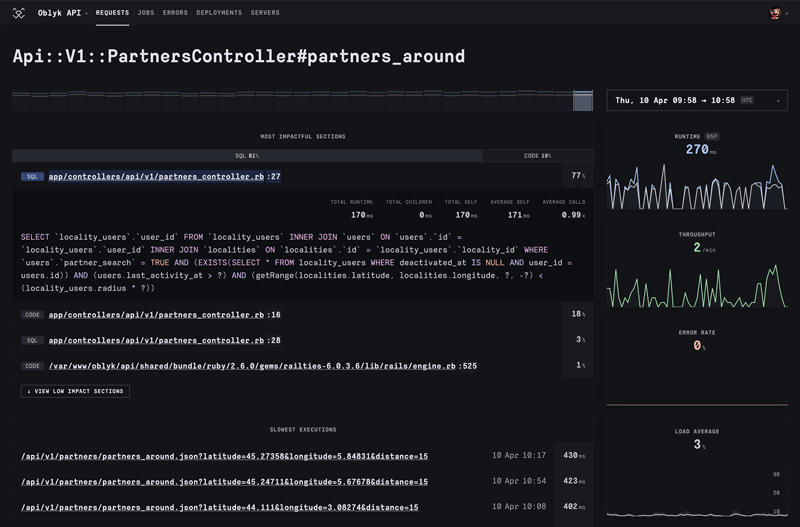Super Fast Rails
Most of the time, optimizing a Rails application requires repeating the same techniques. For example, at the database layer, it's about creating the proper indexes, preventing 1+N queries, etc. Could we do that automatically?

Introducing SuperFastRails!
We are releasing a gem to help developers write ultra-optimized code. The goal is to allow developers to write code as fast as possible without caring about performance. Rails scales; it’s just a matter of writing the correct code.
SuperFastRails automatically improves the requests in your Rails application. Thus, we focus only on the business logic and don’t have to think about indexes, 1+n queries, dangerous migrations, etc.
For the first version, SuperFastRails takes good care of the database layer. We want to keep adding more automatic optimizations in the future. Here is the list of the current automatic optimizations.
Create automatically missing indexes
Let’s see the following query:
SELECT * FROM projects WHERE projects.user_id = ?
Without an index on user_id, the query planner scans the entire table, which is slow because it must go through all rows. By enabling the following option:
SuperFastRails.create_missing_indexes = 500.in_milliseconds
If the query takes longer than 500ms, SuperFastRails analyzes the query plan with EXPLAIN to detect if an index is missing.
In that case, it creates it to match the condition in the where clause.
Thus, when creating a new table in a migration, we don’t have to think about which indexes to make because it does so automatically when the application is running.
Remove unused indexes
Indexes speed up reads, but they slow down writes. So, unused indexes are not good and should be removed. By enabling the following options, it will automatically get rid of unused indexes:
SuperFastRails.remove_unused_indexes = true
The combination of the two options create_missing_indexes and remove_unused_indexes ensures that the database always has relevant indexes, even if the where clauses change.
Optimise automatically SQL
Indexes are essential, but SQL also needs to be written correctly. For example, the following query:
SELECT *
FROM users
WHERE (SELECT count(*) FROM projects WHERE projects.user_id = users.id) > 1
is slower than:
SELECT *
FROM users
WHERE EXISTS (SELECT 1 FROM projects WHERE projects.user_id = users.id)
Because it stops once it finds a row instead of keep counting.
There are a bunch of tricks to know about SQL.
Learning them requires time, and we need to remember them.
The option SuperFastRails.auto_optimise_queries = true parses the SQL, and rewrites it before sending it to the database.
Thanks to it, we don’t have to care about all these tricks.
You can also use it with a block if you prefer to enable it on a smaller scope:
SuperFastRails.optimise_queries do
User.where("(SELECT count(*) FROM projects WHERE user_id = users.id) > 1")
# SELECT *
# FROM users
# WHERE EXISTS (SELECT 1 FROM projects WHERE user_id = users.id)
end
Get rid of 1+N queries
The 1+N queries problem happens when iterating through a collection where the same query is repeated. For the following example:
Project.all.each do |project|
puts "#{project.name} by #{project.user.name}"
end
It triggers one extra query for each project:
SELECT * FROM projects
SELECT * FROM users WHERE users.id = ?
SELECT * FROM users WHERE users.id = ?
SELECT * FROM users WHERE users.id = ?
SELECT * FROM users WHERE users.id = ?
SELECT * FROM users WHERE users.id = ?
SELECT * FROM users WHERE users.id = ?
-- And so on
To solve this, SuperFastRails adds a method each_without_1_plus_n_queries to ActiveRecord relations.
It detects when two identical queries are triggered to load all the missing data in a single query.
Project.all.each_without_1_plus_n_queries do |project|
puts "#{project.name} by #{project.user.name}"
end
SELECT * FROM projects
SELECT * FROM users WHERE users.id = ?
-- Before the 2nd repetition, superFastRails detects the 1+N pattern.
-- So it loads all relevant users in a single query.
SELECT * FROM users WHERE users.id IN (?)
-- No more queries
Protect against dangerous migrations
There are already many gems that help to detect dangerous migrations. They are great, but we still have to do the work manually. For example, renaming a column must be achieved in many steps:
- Create a new column
- Backfill values
- Synchronizing both columns
- Switching the code to the new column
- Ignoring the old column
- Removing the old column
All this is tiring and wasting time. Thanks to SuperFastRails, it can be achieved in a single step with only one line:
SuperFastRails.rename_column :table, :old_name, :new_name
It takes care of creating the new columns, backfilling, and switching them.
Tune database settings
A database must be tuned to efficiently use the hardware. PostgreSQL should be told how much RAM it can use for the cache, the wall size, and the working memory. It’s the same for SQLite, where the journal mode, page size, and so on can be changed.
Currently, there is no other way to do that manually. That’s why we added a method that tunes perfectly the settings:
SuperFastRails.tune_database!
It modifies the settings according to many parameters such as the database hardware, the ratio of reads and writes, the number of concurrent connections, etc.
Install
Install the gem today and speed up your app automatically:
gem "super_fast_rails"
